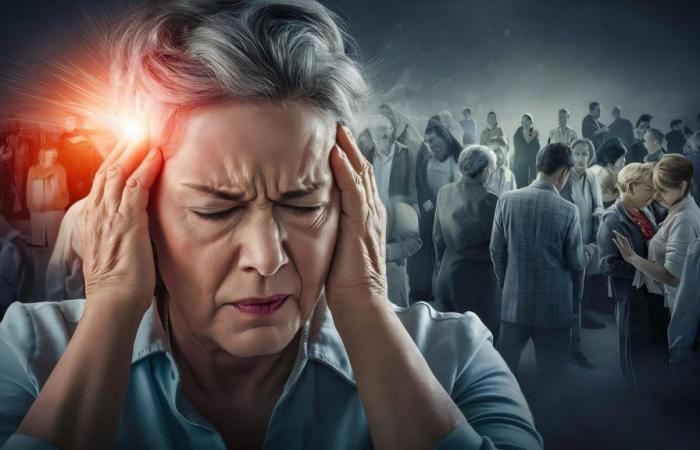
The first signs of dementia are usually noticed when the condition is already progressing. Memory loss or difficulty concentrating are the most obvious.
The first signs of dementia
Laura Roxana Goga, psychologist, explained exclusively to DC MEDICAL why it is important to pay attention to the early signs of dementia.
“I want to emphasize the importance of being aware of the early signs of dementia. Cognitive disorders, reduced scores on the GAFS and MMSE scale, as well as difficulties in temporal-spatial orientation can be indications of an evolution towards this condition.
It is crucial to be alert to these signs and seek medical support for appropriate evaluation and management. Ignoring them can lead to a faster deterioration of health and a loss of personal independence.
See also: Highly contagious disease. What is the first sign. Univ. Prof. Dr. Carmen Dorobăț: It has a respiratory transmission, including contact with dogs and cats
In monitoring the development of dementia, it is essential to look out for several signs and symptoms. Among them are cognitive disorders, expressed by difficulties in the processes of thinking, memory and reasoning. Decreased scores on assessments such as the GAFS (Global Assessment of Functioning Scale) and MMSE (Mini-Mental State Examination) provide important clues to the individual’s functional impairment.
Impaired spatial-temporal orientation is often evident, manifesting as confusion about time and place. In parallel, we see increasing difficulties in maintaining personal independence, from simple everyday tasks to managing complex aspects of life.
These aspects, together with the progression towards disability, are crucial indicators of the evolution of dementia. By understanding and recognizing these signs, we can intervene at an early stage, improving the quality of life of patients and supporting them and their families in the face of this delicate challenge,” says Laura Roxana Goga, psychologist, exclusively for DC MEDICAL.
See also: Substance that causes cancer. Dr. Florin Bălănică: It’s not good! Here it goes!
Person with dementia – PHOTO: Freepik
What is the GAFS score
The GAFS (Global Assessment of Functioning Scale) score is a scale used in mental health to assess a person’s global functioning. It is mainly used in the diagnosis and assessment of mental disorders to determine a person’s overall level of functioning in a wide range of areas, including social, occupational and emotional aspects.
The GAFS score ranges from 1 to 100, where higher scores indicate better functioning, while lower scores indicate lower functioning. It is often used by mental health professionals to monitor progress and evaluate the effectiveness of interventions and treatments.
See also: Skin cancer vaccine in trials. It recognizes and eliminates all cancer cells
What is the MMSE score
The Mini-Mental State Examination (MMSE) score, also known as the Folstein Scale, is an assessment tool used to measure a person’s cognitive function. This is particularly used to assess cognitive disorders such as dementia.
The MMSE comprises a series of questions and tasks that cover different aspects of cognitive function, such as temporal and spatial orientation, memory, attention, numeracy, and language.
The total score ranges from 0 to 30, with lower scores indicating more impaired cognitive function. The MMSE is often used in clinical practice for rapid screening of cognitive impairment and for monitoring changes over time in patients’ cognitive function.
The first signs of dementia
The first signs of dementia can vary from person to person and may include:
Loss of recent memory: Forgetting recent events, often asking the same things or repeating them.
Difficulties in planning and problem solving: Difficulty organizing daily activities, such as paying bills or following a cooking recipe.
Confusion in time and space: Losing the concept of time, forgetting dates or location and difficulty in orientation.
Mood and personality changes: Personality changes, such as becoming more withdrawn or agitated than before.
Difficulty finding the right words: Forgetting common words or difficulty expressing thoughts.
Loss of interest in usual activities: Loss of interest in activities you used to enjoy, such as hobbies or social interaction.
Difficulties in performing household tasks: Difficulty carrying out familiar tasks such as cooking, cleaning or personal care.
These signs may be noticed by the affected person or those around them, and may become more obvious as the disease progresses.
Stay up to date with the latest news. Follow DCMedical on Google News as well
Did this article help you?
Follow the DCMedical Facebook page and the DCMedical Health Dose Instagram page and access more useful content for your health, disease prevention and treatment, first aid measures and useful advice from doctors and patients.
Tags: signs dementia Laura Roxana Goga Ignoring leads rapid deterioration crucial careful
-




